|
|
|
Sort Order |
|
|
|
Items / Page
|
|
|
|
|
|
|
| Srl | Item |
| 1 |
ID:
115928
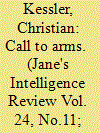

|
|
|
| 2 |
ID:
124877
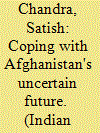

|
|
|
|
|
| Publication |
2013.
|
| Summary/Abstract |
India has, over the last decade or so, been a bit player in Afghanistan, and its influence on political developments there has been marginal. Accordingly, it has been on the fringes of international consultations on Afghanistan. It is not surprising, therefore, that its bitter opposition to talks with the Taliban was ignored. In comparison, Pakistan has been a much more important player and exercised far more influence than India at regional and international fora in the evolution of policies pertaining to Afghanistan. This is partially explicable by Pakistan's extensive border with Afghanistan, age old tribal links, deep rooted linkages with the Taliban, the Haqqani group and Al Qaeda, and a long and tortured history of incessant interference in that country. India's comparative lack of influence is due to the fact that though it has been proactive in bilateral diplomacy vis-à-vis the government of Afghanistan, it has been relatively inactive in reaching out to all shades of opinion in that country, maintaining close contacts with all key external players, and devising innovative and workable strategies for restoring peace and tranquillity in Afghanistan. It is time that India sheds its comparatively reticent posture on Afghanistan and becomes more involved on issues relating to developments there, as otherwise Pakistan will retain its dominant influence, which will obviously work to our detriment.
|
|
|
|
|
|
|
|
|
|
|
|
|
|
|
|
| 3 |
ID:
132538
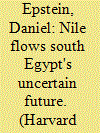

|
|
|
|
|
| Publication |
2014.
|
| Summary/Abstract |
As US citizens celebrated their independence and self-rule on July 4, 2013, they opened their newspapers to find that Egyptians had surrendered theirs. The previous day, amid impassioned protests across the country against the Muslim Brotherhood-led government, the Egyptian Armed Forces removed President Mohammad Morsi from power. For a time, the move dominated headlines. Columnists, academics, and statesmen debated the ethics and ramifications of the coup. But soon, the world moved on. Despite Egypt's vital ongoing struggle to build a nation, coverage of the effort moved out of the mainstream. Now, almost nine months later, Egypt deserves a second look. In late January 2011, Hosni Mubarak, who had governed Egypt since 1981, was overthrown after weeks of mass protest across the country. In the November elections the Muslim Brotherhood, previously illegal, was swept into power with 52 percent of the vote. In June 2012, Muhammad Morsi, a member of the Brotherhood, became the first freely elected President in Egyptian history. Egypt's (seemingly) successful transition to civilian rule drew accolades from the international community. Another victory for democracy. But things were not as rosy as they seemed.
|
|
|
|
|
|
|
|
|
|
|
|
|
|
|
|
| 4 |
ID:
106137
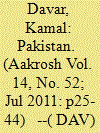

|
|
|
| 5 |
ID:
133991


|
|
|
|
|
| Publication |
2014.
|
| Summary/Abstract |
Russia's policy toward Afghanistan is at a critical juncture. This article aims to explain the evolution of Moscow's policy since 2001, and to assess its future options. The findings of this article are twofold. Moscow attempted to balance two overarching objectives: stabilize Afghanistan and maintain Russia's hegemony in Central Asia. Russian fluctuations toward Afghanistan since 2001 stemmed from changes in its perceived interests and its prioritization of these two objectives. Furthermore, Moscow is becoming increasingly concerned about Afghanistan. However, it has relatively few realistic policy options to address challenges that may develop once international military forces cease major combat operations.
|
|
|
|
|
|
|
|
|
|
|
|
|
|
|
|
| 6 |
ID:
141679
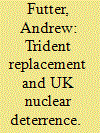

|
|
|
|
|
| Summary/Abstract |
A decision to replace Trident with a like-for-like system will see the UK remain in the nuclear-weapons business well into the second half of this century, but it is far from clear that reliance on a small, retaliatory nuclear capability for deterrence would be the best approach to an increasingly complex future nuclear-threat landscape. Andrew Futter argues that the requirements of deterrence are perhaps more blurred today than at any point in the nuclear age – a situation only likely to get worse. A more holistic and long-term view of UK nuclear policy is needed, with greater consideration given to how techno-military, strategic and, to a lesser extent, political-normative developments are likely to alter, if not transform, the nature of the future deterrence environment.
|
|
|
|
|
|
|
|
|
|
|
|
|
|
|
|
| 7 |
ID:
161752


|
|
|
|
|
| Summary/Abstract |
Forensic science is at a crossroads. In the last two decades, often-used forms of pattern evidence, such as fingerprint, tool mark, and bite mark identification, have faced significant criticism for lacking adequate scientific validation or proven reliability. Is this the beginning of a sea change, signaling the rise of a science-based, empirically grounded approach to these forms of evidence, both in the courtroom and in the crime laboratory? Or has the increased attention produced Band-Aids rather than meaningful and lasting cures? This essay argues that the current state of forensic science reform is both “half empty” and “half full.” Looking first at bite mark evidence, then at modifications in the language used by forensic scientists for their courtroom testimony, and, finally, at the creation and the elimination of the National Commission on Forensic Science, this essay argues that we have thus far seen modest and meaningful – but far from adequate or transformative – reform. Our best hope for sustained, substantial changes necessary for improving forensic science evidence within our system of justice requires the creation of another national commission or other institutional body, made up of both research scientists and other institutional stakeholders, and situated as to prevent “capture” by either forensic practitioners or advocates within our adversarial system.
|
|
|
|
|
|
|
|
|
|
|
|
|
|
|
|
| 8 |
ID:
128091


|
|
|
|
|
| Publication |
2012.
|
| Summary/Abstract |
A contentious poll has seen president Victor Yanukovych's government maintain power, but not rid Ukraine of its political instability. Mark Rachkevych assesses the option for a country facing a prolonged period of parliamentary reshaping.
|
|
|
|
|
|
|
|
|
|
|
|
|
|
|
|
|
|
|
|
|